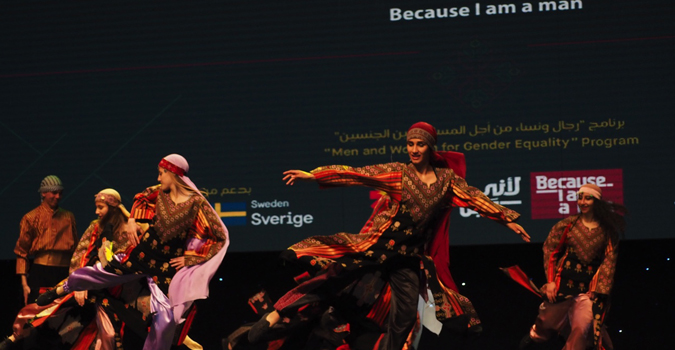UN Women Releases the First Study Revealing Palestinian Men’s Attitudes toward Gender Equality and Two Campaigns Inviting Men to support Women as Equal Partners in the Home and the Workplace
Date:
What does it mean to be a man in the Middle East and North Africa today? How do Palestinian men and women view masculinities, and men’s roles in public and private life - and where do those attitudes come from? Responding to the lack of concrete data gathered on these issues, UN Women and its partners conducted the first multi-country study in the Middle East and North Africa, to better understand men and women’s perspectives on gender roles. The findings of the Palestinian portion of the study were released today in Palestine, at an event that brought together more than 150 representatives of government, civil society and the international community.
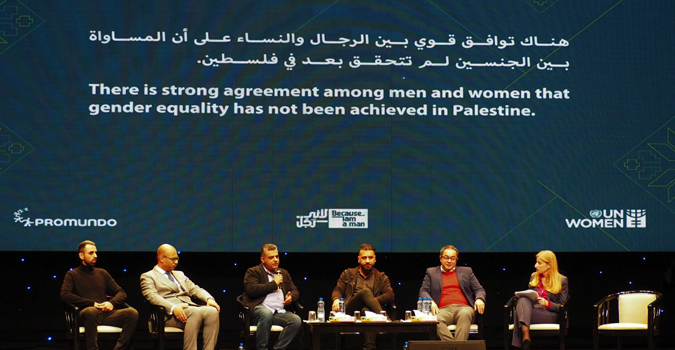
Al-Bireh, Palestine — UN Women today released the findings of the Palestine Report of the International Men and Gender Equality Survey in the Middle East and North Africa (IMAGES MENA) study, in Al-Bireh City, Palestine. The release of the findings, organized by UN Women in collaboration with the Ministry of Women’s Affairs and the the Consulate General of Sweden in Jerusalem, was generously funded by the Swedish International Development Cooperation Agency (Sida). The event that took place in Palestine Red Crescent, aimed to highlight some of the key findings of the study, which is designed to help policy-makers, researchers and activists better understand men and women’s perceptions of gender roles in the Middle East and North Africa.
The IMAGES MENA study was conducted in Egypt, Morocco, Lebanon, and Palestine in 2017. The study has revealed a number of interesting findings. For example, while a majority of men surveyed tend to support a wide array of inequitable attitudes, one quarter of men in the four countries acknowledge and support women’s equality in many aspects of public and private life.
#HappeningNow: Fatherhood photo exhibition showing dads from #Palestine & #Sweden championing #GenderEquality at home. pic.twitter.com/inJQpZViRF
— UN Women Arabic (@unwomenarabic) February 19, 2018
The ground-breaking study was conducted by UN Women and Promundo, a global civil society organisation, with local research partners in Palestine, Egypt, Morocco and Lebanon. The IMAGES Palestine study, developed and implemented in collaboration with the Institute of Women’s Studies at Birzeit University, surveyed a total of 2399 men and women residing in the West Bank and Gaza Strip, from both urban and rural areas. The behaviors and attitudes uncovered in the survey reflect the complexity of gender norms shaped by family influence and life conditions and the Israeli occupation. However, it is noteworthy that the majority of men and women surveyed agreed with the phrase "We Palestinians need to do more effort to promote equality between women and men”.
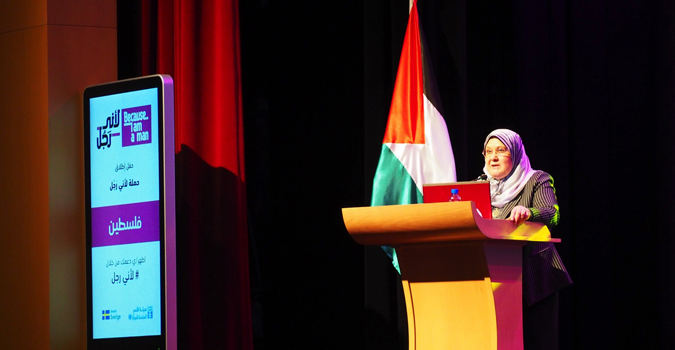
Her Excellency Dr. Haifa Al-Agha, Minister of Women's Affairs, praised the study as "the result of a series of international and domestic actions and policies that reflect our commitment to gender issues at various levels." She added that "it is an affirmation of the deep partnership, and that we are partners in construction, achievement and decision”.
Dr. Al-Agha pointed out the deep gap between men and women in Palestinian society, noting that the study supported the diagnosis of the origins of this problem, and will enhance the priority granted to women’s empowerment in Palestinian society. She noted that despite all achievements to date, the participation of women in public life did not yet reach its full potential, due to the two challenges that Palestinian women face: negative stereotypes and habits, and the violence of the occupation. The Minister stressed the need to use this initiative to empower women and establish their role at all levels.
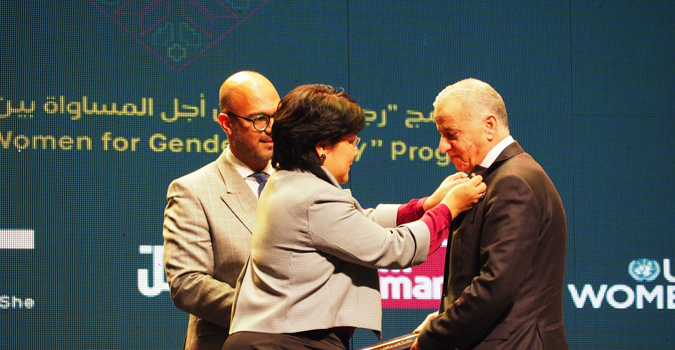
The release of the results of the IMAGES Palestine study also offered an opportunity to launch UN Women’s regional advocacy and awareness campaign #Because_I_am_a_Man, as well as the global campaign HeForShe for the first time in Palestine. The two campaigns aim to change the negative stereotypes related to gender roles in the home and workplace by promoting positive realities and viewpoints related to issues such as men and women’s shared household roles and responsibilities, fatherhood, violence against women and female employment.
Male champions in #Palestine are being honored as #genderequality champions and inspire future generations of champions
— UN Women Arabic (@unwomenarabic) February 19, 2018
تكريم للرجال المناصرين لتمكين المرأة والمساواة بين الجنسين خلال إطلاق دراسة #imagesmena في #فلسطين اليوم. #لأني_رجل #Because_Iam_a_man pic.twitter.com/QT09sYHDEr
To celebrate the launch of the Because I am a Man campaign, a young Palestinian Singer, Bashar Murad, performed his new song by the same title. A short-animated film was screened on the evolving roles of members of an ordinary Palestinian family, seen from the perspective of a 10-year-old boy.
انا زلمة… انا زلمة
— UN Women Arabic (@unwomenarabic) February 19, 2018
بحترمها وبقدرها وبتعلم القوة منها
انا زلمة… انا زلمة
بتسمعلي وبسمعلها وما بحاول اغيرها
I’m a Man, I respect her, I learn how to be powerful from her power
We are equal.@BasharMusic#Because_Iam_a_Man#HeForShe#Palestine pic.twitter.com/LBUJ8nvq07
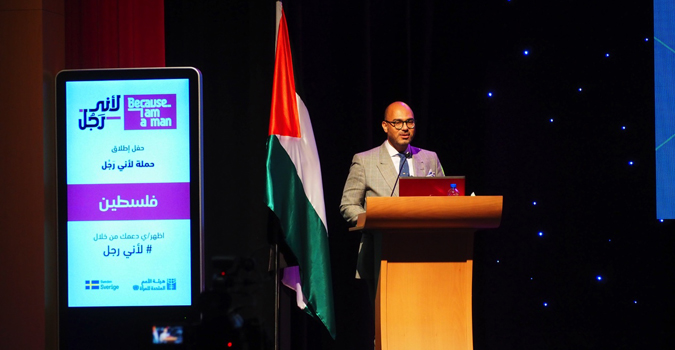
“Because I am a man seeks not to remove the important voices of women, but rather to create a wider space for engaging in a dialogue around gender norms; and ultimately elevate us to a more equal society, wherein women and men, boys and girls have the same opportunities and responsibilities inside and outside the home," said Mohammad Naciri, Regional Director for Arab States, UN Women, acknowledging that the evidence-based findings of IMAGES MENA confirmed the engrained social norms in the four Arab States surveyed.
"#Because_Iam_a_Man I believe that my manhood includes taking care of my children and supporting my wife"-A Palestinian participant during #imagesmena launch in #Palestine @HeForShe pic.twitter.com/ma3JjtpQRB
— UN Women Arabic (@unwomenarabic) February 19, 2018
A photo exhibition was staged by UN Women in collaboration with the Consulate General of Sweden in Jerusalem, organized two photo exhibitions presenting images of Palestinian and Swedish fathers promoting gender equality through their actions in the home. The exhibition aimed to highlight the benefits for families when fathers are involved in every aspect of family life.
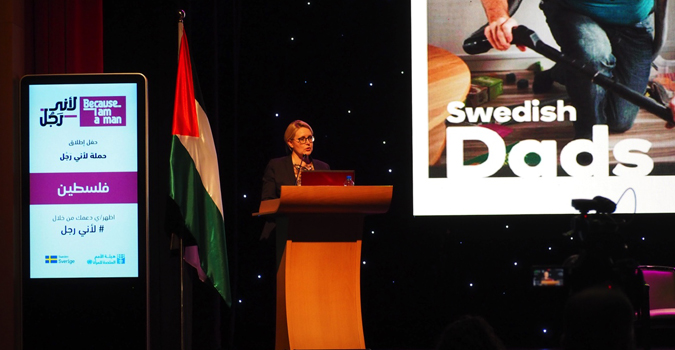
“Children, women and men all benefit when fathers claim parental leave. Paternity leave also increases women’s participation in the labour market, something that is key for any economy to reach its full potential. These are two aspects that we want to highlight by bringing the photo exhibition Swedish Dads to Palestine,” said Anne-Sofie Nilson, the Consul General of Sweden in Jerusalem.
